Leadership Theories and Personal Reflection: UMOCB6-15-M Report
VerifiedAdded on 2022/09/13
|10
|2527
|9
Report
AI Summary
This report is a comprehensive reflection on various leadership theories, drawing upon both theoretical knowledge from the UMOCB6-15-M module and practical experiences within organizations. The author explores diverse leadership styles, including charismatic, transformational, and relational approaches, and examines their application in different contexts. The report delves into key aspects of leadership such as ethical decision-making, change management, cultural diversity, and communication. The author reflects on personal experiences to illustrate the concepts, highlighting the importance of adapting leadership styles to suit different situations and stakeholders. Furthermore, the report emphasizes the significance of understanding employee needs, fostering ethical practices, and effectively managing change within organizations. The author also explores the importance of cultural efficiency and the impact of diversity in the workplace and how it influences leadership effectiveness. Finally, the author provides a self-assessment of their leadership approach and outlines areas for future development.
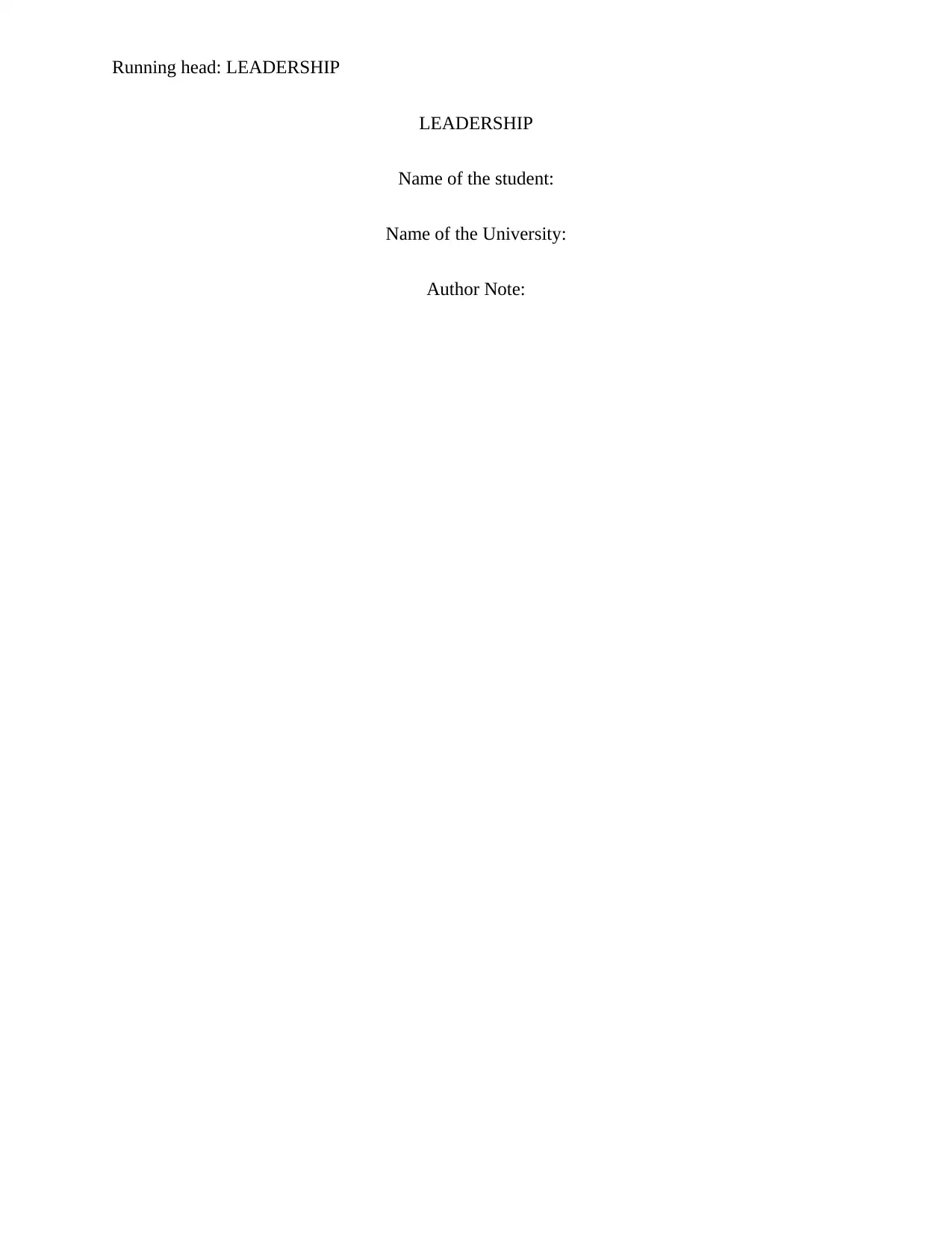
Running head: LEADERSHIP
LEADERSHIP
Name of the student:
Name of the University:
Author Note:
LEADERSHIP
Name of the student:
Name of the University:
Author Note:
Paraphrase This Document
Need a fresh take? Get an instant paraphrase of this document with our AI Paraphraser
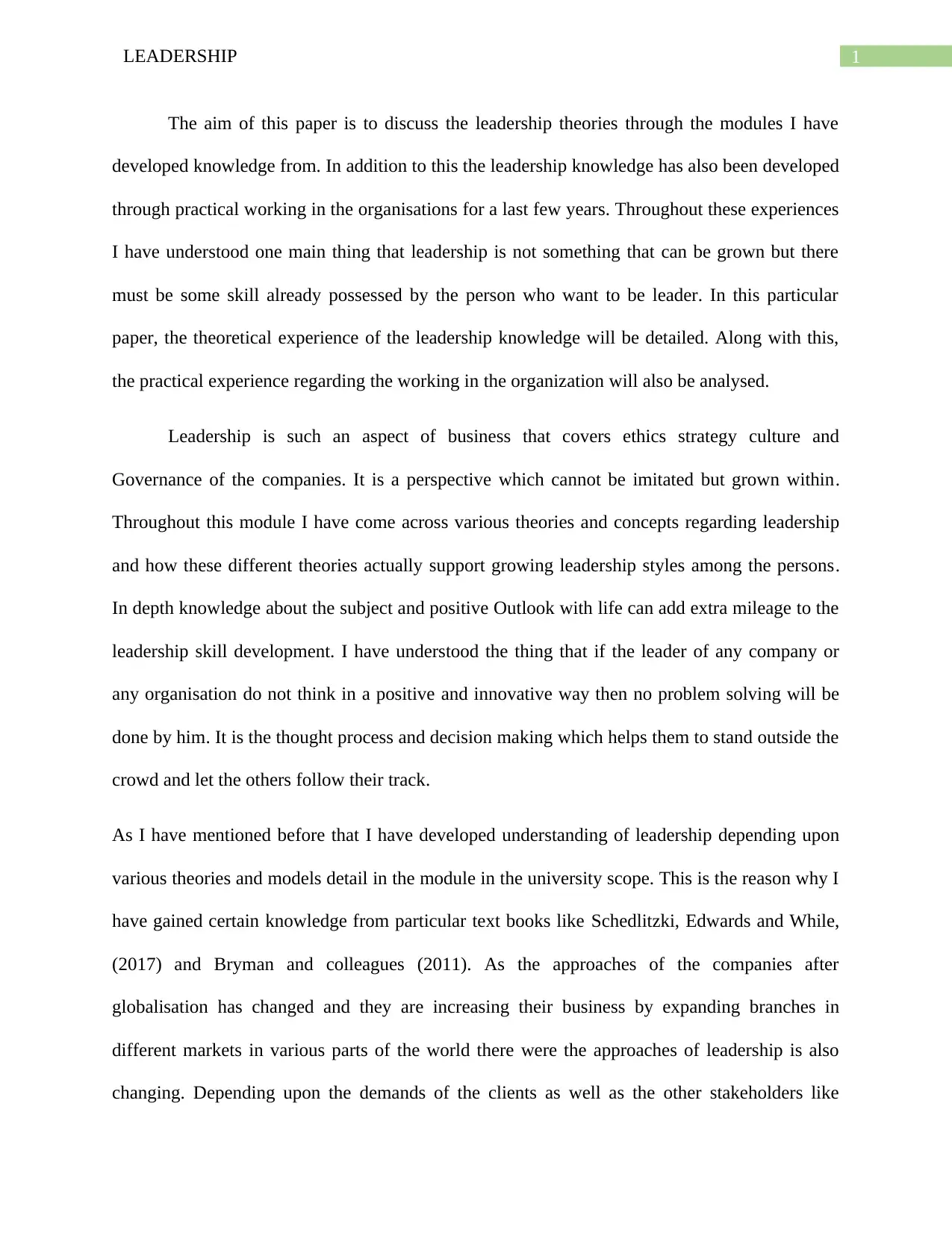
1LEADERSHIP
The aim of this paper is to discuss the leadership theories through the modules I have
developed knowledge from. In addition to this the leadership knowledge has also been developed
through practical working in the organisations for a last few years. Throughout these experiences
I have understood one main thing that leadership is not something that can be grown but there
must be some skill already possessed by the person who want to be leader. In this particular
paper, the theoretical experience of the leadership knowledge will be detailed. Along with this,
the practical experience regarding the working in the organization will also be analysed.
Leadership is such an aspect of business that covers ethics strategy culture and
Governance of the companies. It is a perspective which cannot be imitated but grown within.
Throughout this module I have come across various theories and concepts regarding leadership
and how these different theories actually support growing leadership styles among the persons.
In depth knowledge about the subject and positive Outlook with life can add extra mileage to the
leadership skill development. I have understood the thing that if the leader of any company or
any organisation do not think in a positive and innovative way then no problem solving will be
done by him. It is the thought process and decision making which helps them to stand outside the
crowd and let the others follow their track.
As I have mentioned before that I have developed understanding of leadership depending upon
various theories and models detail in the module in the university scope. This is the reason why I
have gained certain knowledge from particular text books like Schedlitzki, Edwards and While,
(2017) and Bryman and colleagues (2011). As the approaches of the companies after
globalisation has changed and they are increasing their business by expanding branches in
different markets in various parts of the world there were the approaches of leadership is also
changing. Depending upon the demands of the clients as well as the other stakeholders like
The aim of this paper is to discuss the leadership theories through the modules I have
developed knowledge from. In addition to this the leadership knowledge has also been developed
through practical working in the organisations for a last few years. Throughout these experiences
I have understood one main thing that leadership is not something that can be grown but there
must be some skill already possessed by the person who want to be leader. In this particular
paper, the theoretical experience of the leadership knowledge will be detailed. Along with this,
the practical experience regarding the working in the organization will also be analysed.
Leadership is such an aspect of business that covers ethics strategy culture and
Governance of the companies. It is a perspective which cannot be imitated but grown within.
Throughout this module I have come across various theories and concepts regarding leadership
and how these different theories actually support growing leadership styles among the persons.
In depth knowledge about the subject and positive Outlook with life can add extra mileage to the
leadership skill development. I have understood the thing that if the leader of any company or
any organisation do not think in a positive and innovative way then no problem solving will be
done by him. It is the thought process and decision making which helps them to stand outside the
crowd and let the others follow their track.
As I have mentioned before that I have developed understanding of leadership depending upon
various theories and models detail in the module in the university scope. This is the reason why I
have gained certain knowledge from particular text books like Schedlitzki, Edwards and While,
(2017) and Bryman and colleagues (2011). As the approaches of the companies after
globalisation has changed and they are increasing their business by expanding branches in
different markets in various parts of the world there were the approaches of leadership is also
changing. Depending upon the demands of the clients as well as the other stakeholders like
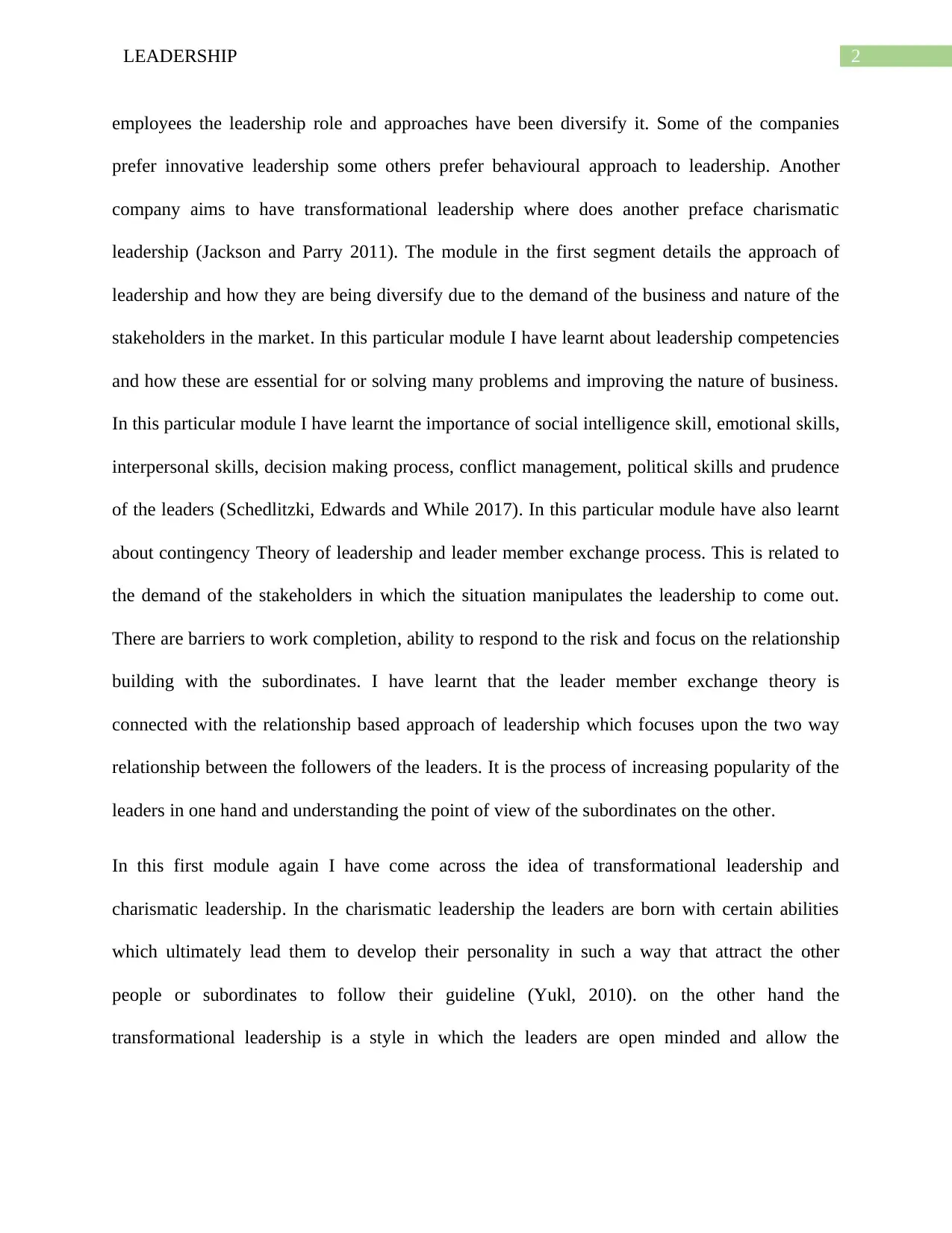
2LEADERSHIP
employees the leadership role and approaches have been diversify it. Some of the companies
prefer innovative leadership some others prefer behavioural approach to leadership. Another
company aims to have transformational leadership where does another preface charismatic
leadership (Jackson and Parry 2011). The module in the first segment details the approach of
leadership and how they are being diversify due to the demand of the business and nature of the
stakeholders in the market. In this particular module I have learnt about leadership competencies
and how these are essential for or solving many problems and improving the nature of business.
In this particular module I have learnt the importance of social intelligence skill, emotional skills,
interpersonal skills, decision making process, conflict management, political skills and prudence
of the leaders (Schedlitzki, Edwards and While 2017). In this particular module have also learnt
about contingency Theory of leadership and leader member exchange process. This is related to
the demand of the stakeholders in which the situation manipulates the leadership to come out.
There are barriers to work completion, ability to respond to the risk and focus on the relationship
building with the subordinates. I have learnt that the leader member exchange theory is
connected with the relationship based approach of leadership which focuses upon the two way
relationship between the followers of the leaders. It is the process of increasing popularity of the
leaders in one hand and understanding the point of view of the subordinates on the other.
In this first module again I have come across the idea of transformational leadership and
charismatic leadership. In the charismatic leadership the leaders are born with certain abilities
which ultimately lead them to develop their personality in such a way that attract the other
people or subordinates to follow their guideline (Yukl, 2010). on the other hand the
transformational leadership is a style in which the leaders are open minded and allow the
employees the leadership role and approaches have been diversify it. Some of the companies
prefer innovative leadership some others prefer behavioural approach to leadership. Another
company aims to have transformational leadership where does another preface charismatic
leadership (Jackson and Parry 2011). The module in the first segment details the approach of
leadership and how they are being diversify due to the demand of the business and nature of the
stakeholders in the market. In this particular module I have learnt about leadership competencies
and how these are essential for or solving many problems and improving the nature of business.
In this particular module I have learnt the importance of social intelligence skill, emotional skills,
interpersonal skills, decision making process, conflict management, political skills and prudence
of the leaders (Schedlitzki, Edwards and While 2017). In this particular module have also learnt
about contingency Theory of leadership and leader member exchange process. This is related to
the demand of the stakeholders in which the situation manipulates the leadership to come out.
There are barriers to work completion, ability to respond to the risk and focus on the relationship
building with the subordinates. I have learnt that the leader member exchange theory is
connected with the relationship based approach of leadership which focuses upon the two way
relationship between the followers of the leaders. It is the process of increasing popularity of the
leaders in one hand and understanding the point of view of the subordinates on the other.
In this first module again I have come across the idea of transformational leadership and
charismatic leadership. In the charismatic leadership the leaders are born with certain abilities
which ultimately lead them to develop their personality in such a way that attract the other
people or subordinates to follow their guideline (Yukl, 2010). on the other hand the
transformational leadership is a style in which the leaders are open minded and allow the
⊘ This is a preview!⊘
Do you want full access?
Subscribe today to unlock all pages.

Trusted by 1+ million students worldwide
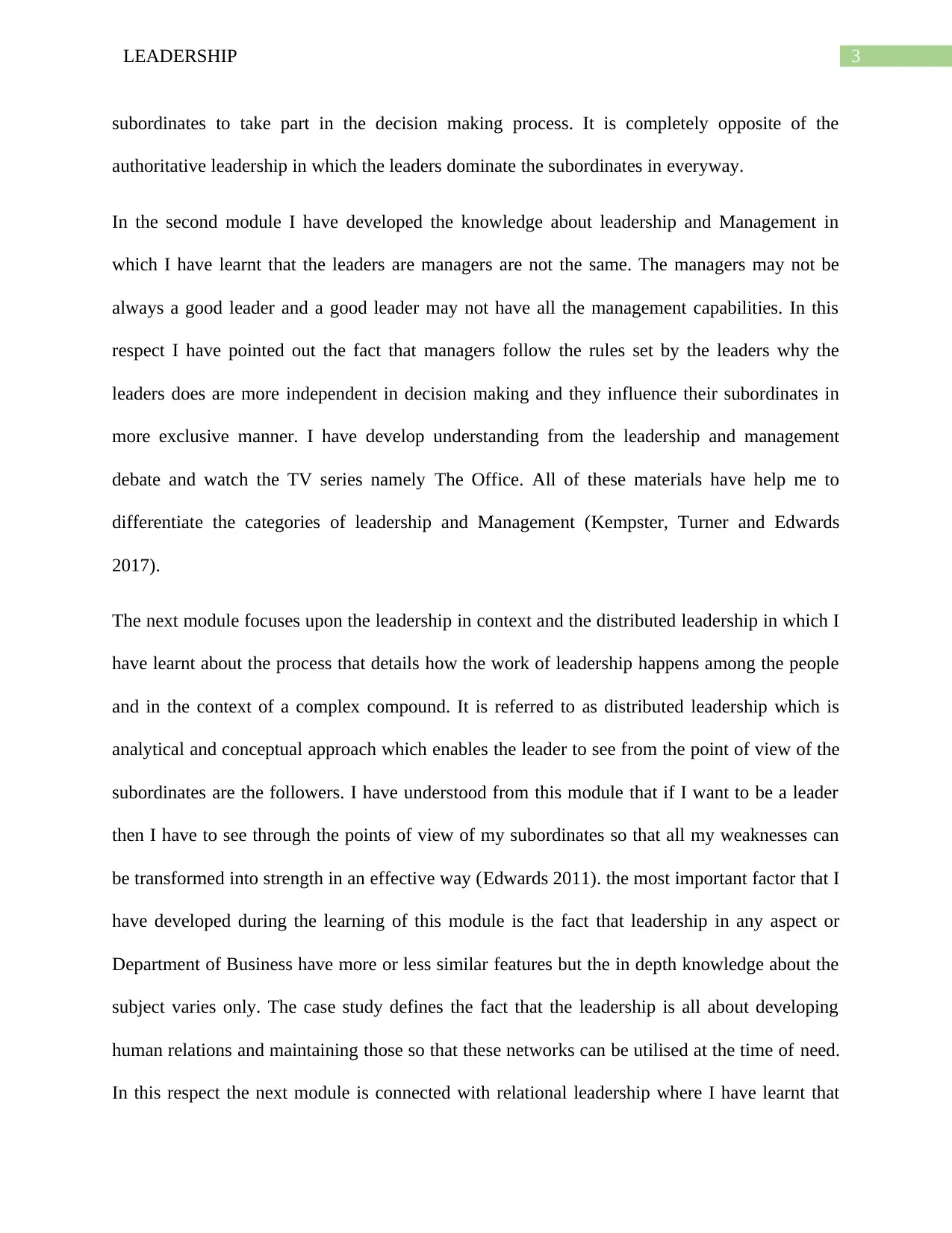
3LEADERSHIP
subordinates to take part in the decision making process. It is completely opposite of the
authoritative leadership in which the leaders dominate the subordinates in everyway.
In the second module I have developed the knowledge about leadership and Management in
which I have learnt that the leaders are managers are not the same. The managers may not be
always a good leader and a good leader may not have all the management capabilities. In this
respect I have pointed out the fact that managers follow the rules set by the leaders why the
leaders does are more independent in decision making and they influence their subordinates in
more exclusive manner. I have develop understanding from the leadership and management
debate and watch the TV series namely The Office. All of these materials have help me to
differentiate the categories of leadership and Management (Kempster, Turner and Edwards
2017).
The next module focuses upon the leadership in context and the distributed leadership in which I
have learnt about the process that details how the work of leadership happens among the people
and in the context of a complex compound. It is referred to as distributed leadership which is
analytical and conceptual approach which enables the leader to see from the point of view of the
subordinates are the followers. I have understood from this module that if I want to be a leader
then I have to see through the points of view of my subordinates so that all my weaknesses can
be transformed into strength in an effective way (Edwards 2011). the most important factor that I
have developed during the learning of this module is the fact that leadership in any aspect or
Department of Business have more or less similar features but the in depth knowledge about the
subject varies only. The case study defines the fact that the leadership is all about developing
human relations and maintaining those so that these networks can be utilised at the time of need.
In this respect the next module is connected with relational leadership where I have learnt that
subordinates to take part in the decision making process. It is completely opposite of the
authoritative leadership in which the leaders dominate the subordinates in everyway.
In the second module I have developed the knowledge about leadership and Management in
which I have learnt that the leaders are managers are not the same. The managers may not be
always a good leader and a good leader may not have all the management capabilities. In this
respect I have pointed out the fact that managers follow the rules set by the leaders why the
leaders does are more independent in decision making and they influence their subordinates in
more exclusive manner. I have develop understanding from the leadership and management
debate and watch the TV series namely The Office. All of these materials have help me to
differentiate the categories of leadership and Management (Kempster, Turner and Edwards
2017).
The next module focuses upon the leadership in context and the distributed leadership in which I
have learnt about the process that details how the work of leadership happens among the people
and in the context of a complex compound. It is referred to as distributed leadership which is
analytical and conceptual approach which enables the leader to see from the point of view of the
subordinates are the followers. I have understood from this module that if I want to be a leader
then I have to see through the points of view of my subordinates so that all my weaknesses can
be transformed into strength in an effective way (Edwards 2011). the most important factor that I
have developed during the learning of this module is the fact that leadership in any aspect or
Department of Business have more or less similar features but the in depth knowledge about the
subject varies only. The case study defines the fact that the leadership is all about developing
human relations and maintaining those so that these networks can be utilised at the time of need.
In this respect the next module is connected with relational leadership where I have learnt that
Paraphrase This Document
Need a fresh take? Get an instant paraphrase of this document with our AI Paraphraser
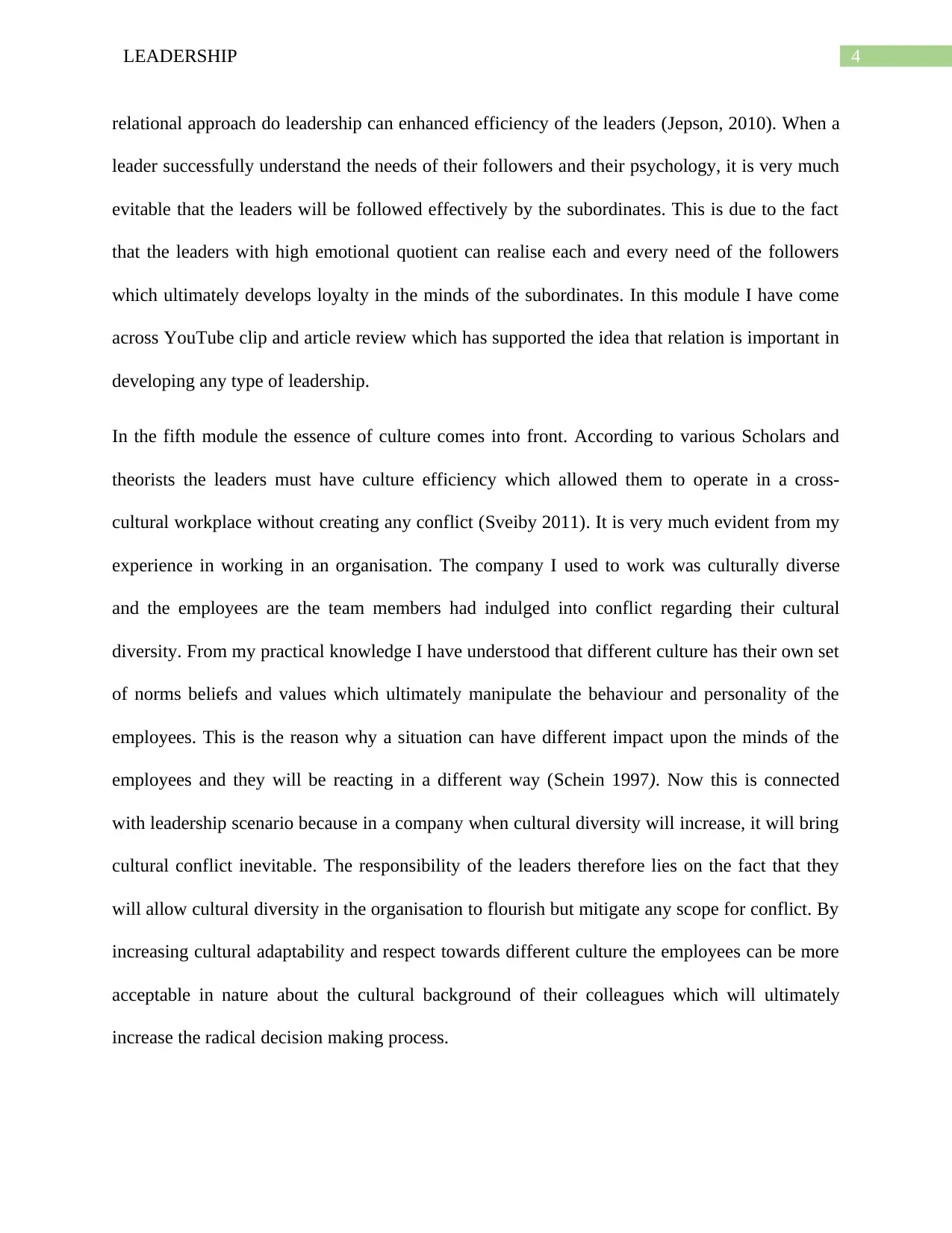
4LEADERSHIP
relational approach do leadership can enhanced efficiency of the leaders (Jepson, 2010). When a
leader successfully understand the needs of their followers and their psychology, it is very much
evitable that the leaders will be followed effectively by the subordinates. This is due to the fact
that the leaders with high emotional quotient can realise each and every need of the followers
which ultimately develops loyalty in the minds of the subordinates. In this module I have come
across YouTube clip and article review which has supported the idea that relation is important in
developing any type of leadership.
In the fifth module the essence of culture comes into front. According to various Scholars and
theorists the leaders must have culture efficiency which allowed them to operate in a cross-
cultural workplace without creating any conflict (Sveiby 2011). It is very much evident from my
experience in working in an organisation. The company I used to work was culturally diverse
and the employees are the team members had indulged into conflict regarding their cultural
diversity. From my practical knowledge I have understood that different culture has their own set
of norms beliefs and values which ultimately manipulate the behaviour and personality of the
employees. This is the reason why a situation can have different impact upon the minds of the
employees and they will be reacting in a different way (Schein 1997). Now this is connected
with leadership scenario because in a company when cultural diversity will increase, it will bring
cultural conflict inevitable. The responsibility of the leaders therefore lies on the fact that they
will allow cultural diversity in the organisation to flourish but mitigate any scope for conflict. By
increasing cultural adaptability and respect towards different culture the employees can be more
acceptable in nature about the cultural background of their colleagues which will ultimately
increase the radical decision making process.
relational approach do leadership can enhanced efficiency of the leaders (Jepson, 2010). When a
leader successfully understand the needs of their followers and their psychology, it is very much
evitable that the leaders will be followed effectively by the subordinates. This is due to the fact
that the leaders with high emotional quotient can realise each and every need of the followers
which ultimately develops loyalty in the minds of the subordinates. In this module I have come
across YouTube clip and article review which has supported the idea that relation is important in
developing any type of leadership.
In the fifth module the essence of culture comes into front. According to various Scholars and
theorists the leaders must have culture efficiency which allowed them to operate in a cross-
cultural workplace without creating any conflict (Sveiby 2011). It is very much evident from my
experience in working in an organisation. The company I used to work was culturally diverse
and the employees are the team members had indulged into conflict regarding their cultural
diversity. From my practical knowledge I have understood that different culture has their own set
of norms beliefs and values which ultimately manipulate the behaviour and personality of the
employees. This is the reason why a situation can have different impact upon the minds of the
employees and they will be reacting in a different way (Schein 1997). Now this is connected
with leadership scenario because in a company when cultural diversity will increase, it will bring
cultural conflict inevitable. The responsibility of the leaders therefore lies on the fact that they
will allow cultural diversity in the organisation to flourish but mitigate any scope for conflict. By
increasing cultural adaptability and respect towards different culture the employees can be more
acceptable in nature about the cultural background of their colleagues which will ultimately
increase the radical decision making process.
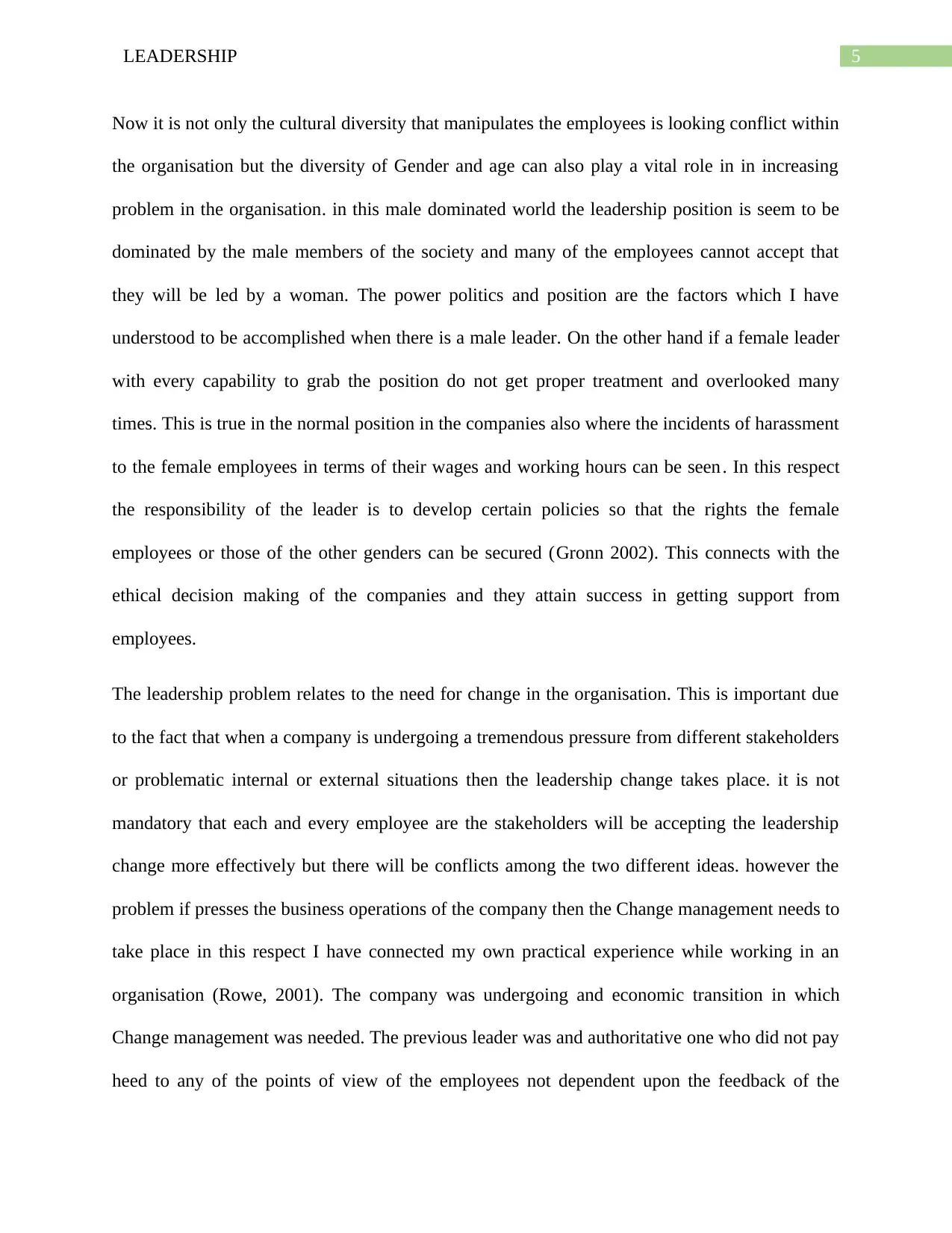
5LEADERSHIP
Now it is not only the cultural diversity that manipulates the employees is looking conflict within
the organisation but the diversity of Gender and age can also play a vital role in in increasing
problem in the organisation. in this male dominated world the leadership position is seem to be
dominated by the male members of the society and many of the employees cannot accept that
they will be led by a woman. The power politics and position are the factors which I have
understood to be accomplished when there is a male leader. On the other hand if a female leader
with every capability to grab the position do not get proper treatment and overlooked many
times. This is true in the normal position in the companies also where the incidents of harassment
to the female employees in terms of their wages and working hours can be seen. In this respect
the responsibility of the leader is to develop certain policies so that the rights the female
employees or those of the other genders can be secured (Gronn 2002). This connects with the
ethical decision making of the companies and they attain success in getting support from
employees.
The leadership problem relates to the need for change in the organisation. This is important due
to the fact that when a company is undergoing a tremendous pressure from different stakeholders
or problematic internal or external situations then the leadership change takes place. it is not
mandatory that each and every employee are the stakeholders will be accepting the leadership
change more effectively but there will be conflicts among the two different ideas. however the
problem if presses the business operations of the company then the Change management needs to
take place in this respect I have connected my own practical experience while working in an
organisation (Rowe, 2001). The company was undergoing and economic transition in which
Change management was needed. The previous leader was and authoritative one who did not pay
heed to any of the points of view of the employees not dependent upon the feedback of the
Now it is not only the cultural diversity that manipulates the employees is looking conflict within
the organisation but the diversity of Gender and age can also play a vital role in in increasing
problem in the organisation. in this male dominated world the leadership position is seem to be
dominated by the male members of the society and many of the employees cannot accept that
they will be led by a woman. The power politics and position are the factors which I have
understood to be accomplished when there is a male leader. On the other hand if a female leader
with every capability to grab the position do not get proper treatment and overlooked many
times. This is true in the normal position in the companies also where the incidents of harassment
to the female employees in terms of their wages and working hours can be seen. In this respect
the responsibility of the leader is to develop certain policies so that the rights the female
employees or those of the other genders can be secured (Gronn 2002). This connects with the
ethical decision making of the companies and they attain success in getting support from
employees.
The leadership problem relates to the need for change in the organisation. This is important due
to the fact that when a company is undergoing a tremendous pressure from different stakeholders
or problematic internal or external situations then the leadership change takes place. it is not
mandatory that each and every employee are the stakeholders will be accepting the leadership
change more effectively but there will be conflicts among the two different ideas. however the
problem if presses the business operations of the company then the Change management needs to
take place in this respect I have connected my own practical experience while working in an
organisation (Rowe, 2001). The company was undergoing and economic transition in which
Change management was needed. The previous leader was and authoritative one who did not pay
heed to any of the points of view of the employees not dependent upon the feedback of the
⊘ This is a preview!⊘
Do you want full access?
Subscribe today to unlock all pages.

Trusted by 1+ million students worldwide
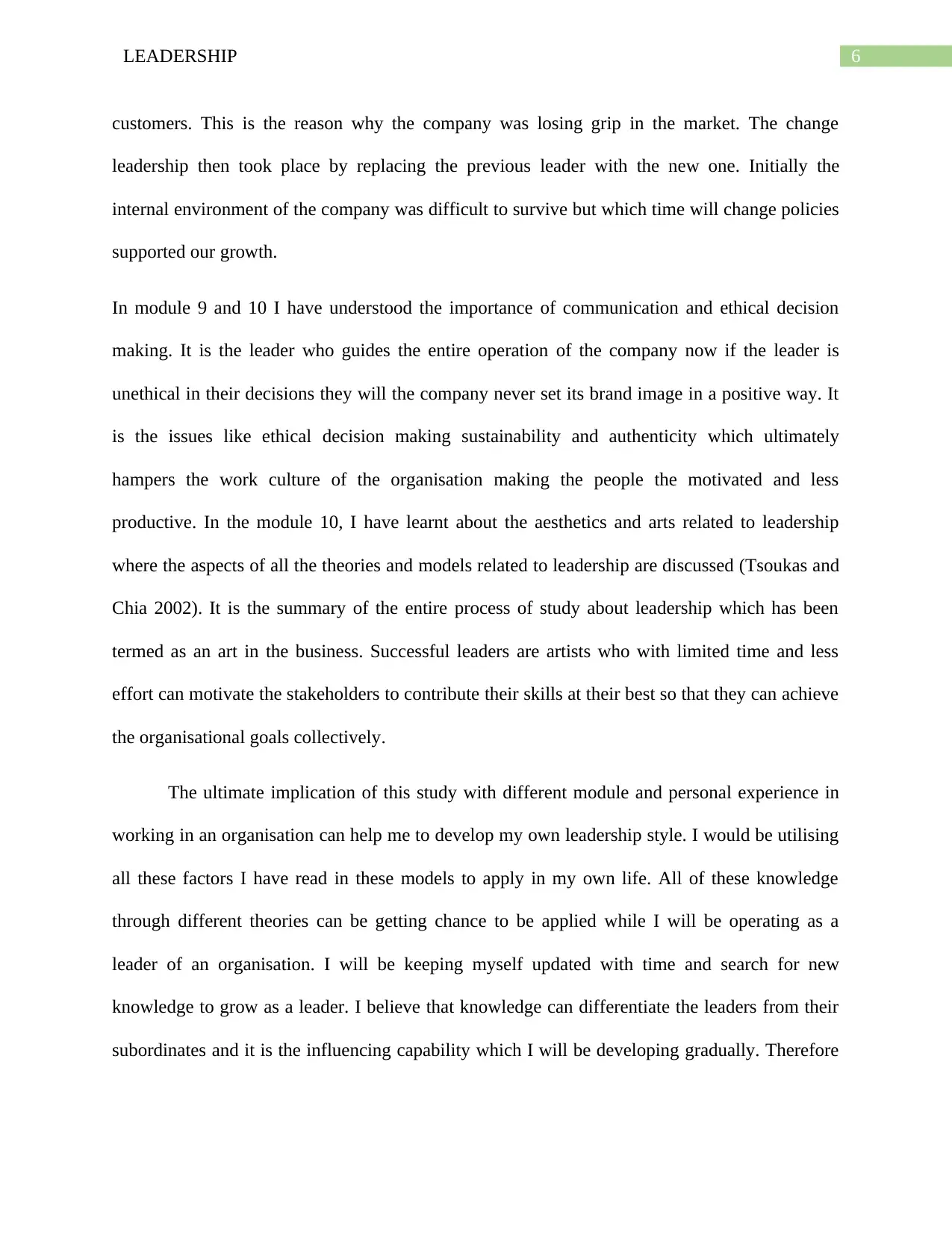
6LEADERSHIP
customers. This is the reason why the company was losing grip in the market. The change
leadership then took place by replacing the previous leader with the new one. Initially the
internal environment of the company was difficult to survive but which time will change policies
supported our growth.
In module 9 and 10 I have understood the importance of communication and ethical decision
making. It is the leader who guides the entire operation of the company now if the leader is
unethical in their decisions they will the company never set its brand image in a positive way. It
is the issues like ethical decision making sustainability and authenticity which ultimately
hampers the work culture of the organisation making the people the motivated and less
productive. In the module 10, I have learnt about the aesthetics and arts related to leadership
where the aspects of all the theories and models related to leadership are discussed (Tsoukas and
Chia 2002). It is the summary of the entire process of study about leadership which has been
termed as an art in the business. Successful leaders are artists who with limited time and less
effort can motivate the stakeholders to contribute their skills at their best so that they can achieve
the organisational goals collectively.
The ultimate implication of this study with different module and personal experience in
working in an organisation can help me to develop my own leadership style. I would be utilising
all these factors I have read in these models to apply in my own life. All of these knowledge
through different theories can be getting chance to be applied while I will be operating as a
leader of an organisation. I will be keeping myself updated with time and search for new
knowledge to grow as a leader. I believe that knowledge can differentiate the leaders from their
subordinates and it is the influencing capability which I will be developing gradually. Therefore
customers. This is the reason why the company was losing grip in the market. The change
leadership then took place by replacing the previous leader with the new one. Initially the
internal environment of the company was difficult to survive but which time will change policies
supported our growth.
In module 9 and 10 I have understood the importance of communication and ethical decision
making. It is the leader who guides the entire operation of the company now if the leader is
unethical in their decisions they will the company never set its brand image in a positive way. It
is the issues like ethical decision making sustainability and authenticity which ultimately
hampers the work culture of the organisation making the people the motivated and less
productive. In the module 10, I have learnt about the aesthetics and arts related to leadership
where the aspects of all the theories and models related to leadership are discussed (Tsoukas and
Chia 2002). It is the summary of the entire process of study about leadership which has been
termed as an art in the business. Successful leaders are artists who with limited time and less
effort can motivate the stakeholders to contribute their skills at their best so that they can achieve
the organisational goals collectively.
The ultimate implication of this study with different module and personal experience in
working in an organisation can help me to develop my own leadership style. I would be utilising
all these factors I have read in these models to apply in my own life. All of these knowledge
through different theories can be getting chance to be applied while I will be operating as a
leader of an organisation. I will be keeping myself updated with time and search for new
knowledge to grow as a leader. I believe that knowledge can differentiate the leaders from their
subordinates and it is the influencing capability which I will be developing gradually. Therefore
Paraphrase This Document
Need a fresh take? Get an instant paraphrase of this document with our AI Paraphraser
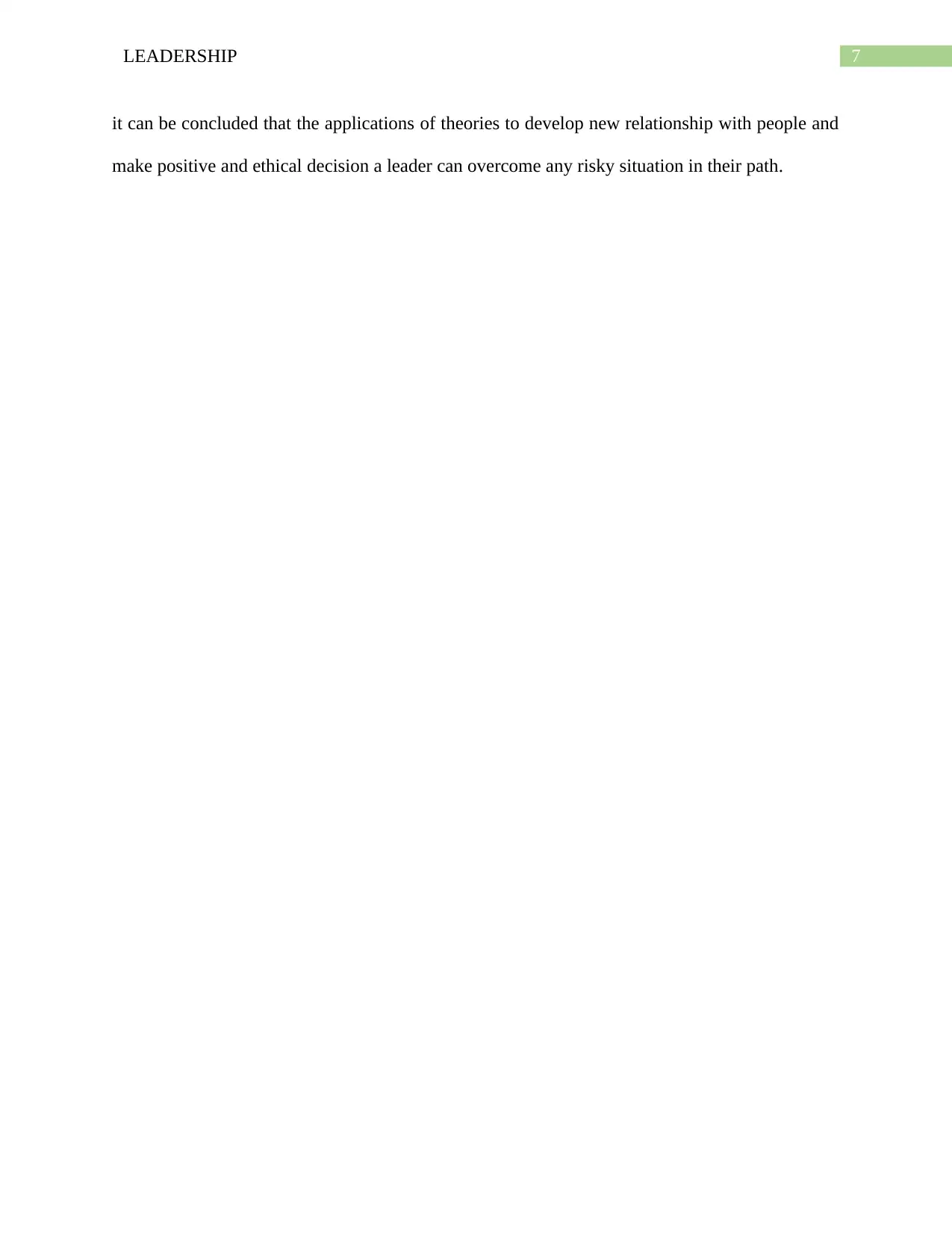
7LEADERSHIP
it can be concluded that the applications of theories to develop new relationship with people and
make positive and ethical decision a leader can overcome any risky situation in their path.
it can be concluded that the applications of theories to develop new relationship with people and
make positive and ethical decision a leader can overcome any risky situation in their path.
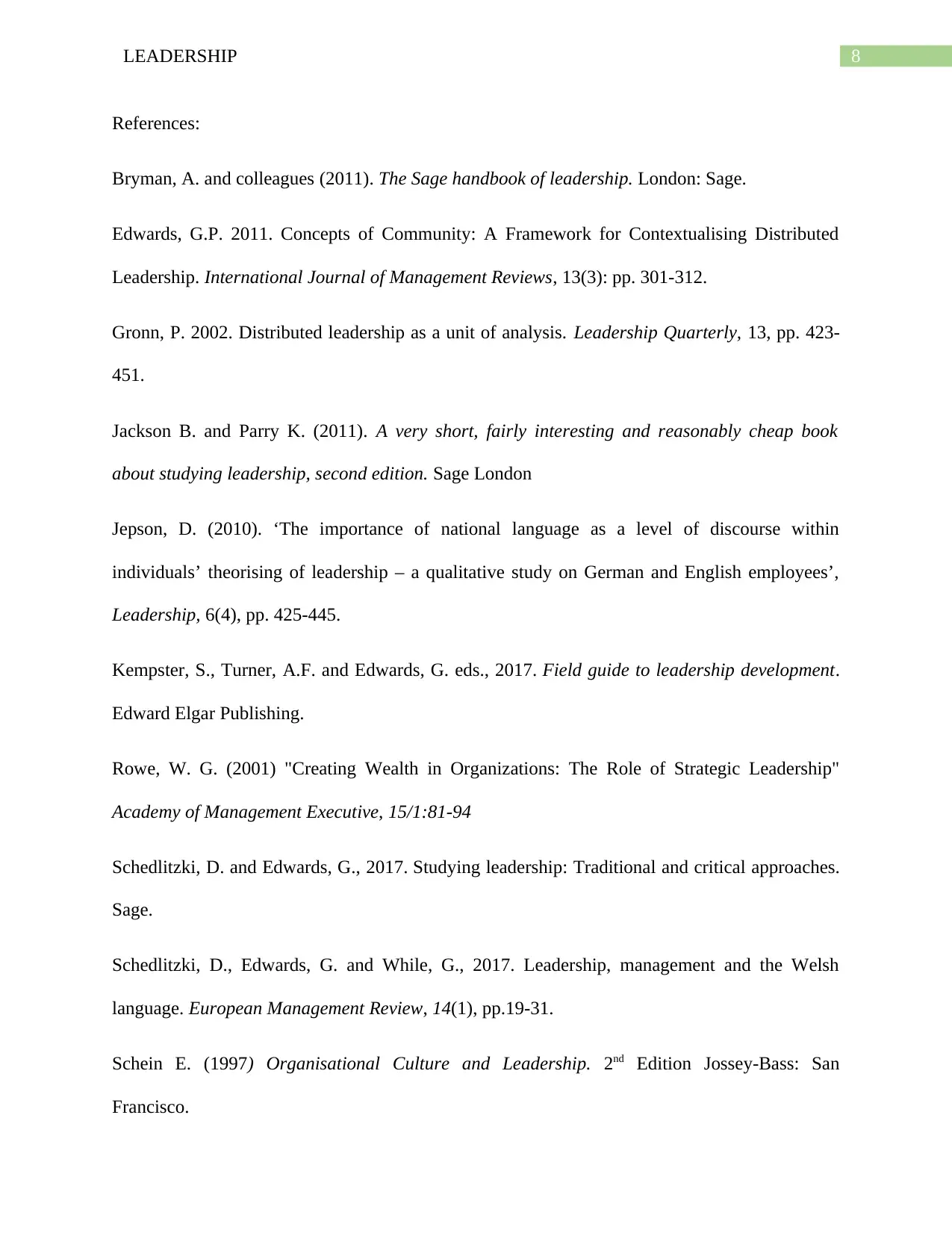
8LEADERSHIP
References:
Bryman, A. and colleagues (2011). The Sage handbook of leadership. London: Sage.
Edwards, G.P. 2011. Concepts of Community: A Framework for Contextualising Distributed
Leadership. International Journal of Management Reviews, 13(3): pp. 301-312.
Gronn, P. 2002. Distributed leadership as a unit of analysis. Leadership Quarterly, 13, pp. 423-
451.
Jackson B. and Parry K. (2011). A very short, fairly interesting and reasonably cheap book
about studying leadership, second edition. Sage London
Jepson, D. (2010). ‘The importance of national language as a level of discourse within
individuals’ theorising of leadership – a qualitative study on German and English employees’,
Leadership, 6(4), pp. 425-445.
Kempster, S., Turner, A.F. and Edwards, G. eds., 2017. Field guide to leadership development.
Edward Elgar Publishing.
Rowe, W. G. (2001) "Creating Wealth in Organizations: The Role of Strategic Leadership"
Academy of Management Executive, 15/1:81-94
Schedlitzki, D. and Edwards, G., 2017. Studying leadership: Traditional and critical approaches.
Sage.
Schedlitzki, D., Edwards, G. and While, G., 2017. Leadership, management and the Welsh
language. European Management Review, 14(1), pp.19-31.
Schein E. (1997) Organisational Culture and Leadership. 2nd Edition Jossey-Bass: San
Francisco.
References:
Bryman, A. and colleagues (2011). The Sage handbook of leadership. London: Sage.
Edwards, G.P. 2011. Concepts of Community: A Framework for Contextualising Distributed
Leadership. International Journal of Management Reviews, 13(3): pp. 301-312.
Gronn, P. 2002. Distributed leadership as a unit of analysis. Leadership Quarterly, 13, pp. 423-
451.
Jackson B. and Parry K. (2011). A very short, fairly interesting and reasonably cheap book
about studying leadership, second edition. Sage London
Jepson, D. (2010). ‘The importance of national language as a level of discourse within
individuals’ theorising of leadership – a qualitative study on German and English employees’,
Leadership, 6(4), pp. 425-445.
Kempster, S., Turner, A.F. and Edwards, G. eds., 2017. Field guide to leadership development.
Edward Elgar Publishing.
Rowe, W. G. (2001) "Creating Wealth in Organizations: The Role of Strategic Leadership"
Academy of Management Executive, 15/1:81-94
Schedlitzki, D. and Edwards, G., 2017. Studying leadership: Traditional and critical approaches.
Sage.
Schedlitzki, D., Edwards, G. and While, G., 2017. Leadership, management and the Welsh
language. European Management Review, 14(1), pp.19-31.
Schein E. (1997) Organisational Culture and Leadership. 2nd Edition Jossey-Bass: San
Francisco.
⊘ This is a preview!⊘
Do you want full access?
Subscribe today to unlock all pages.

Trusted by 1+ million students worldwide
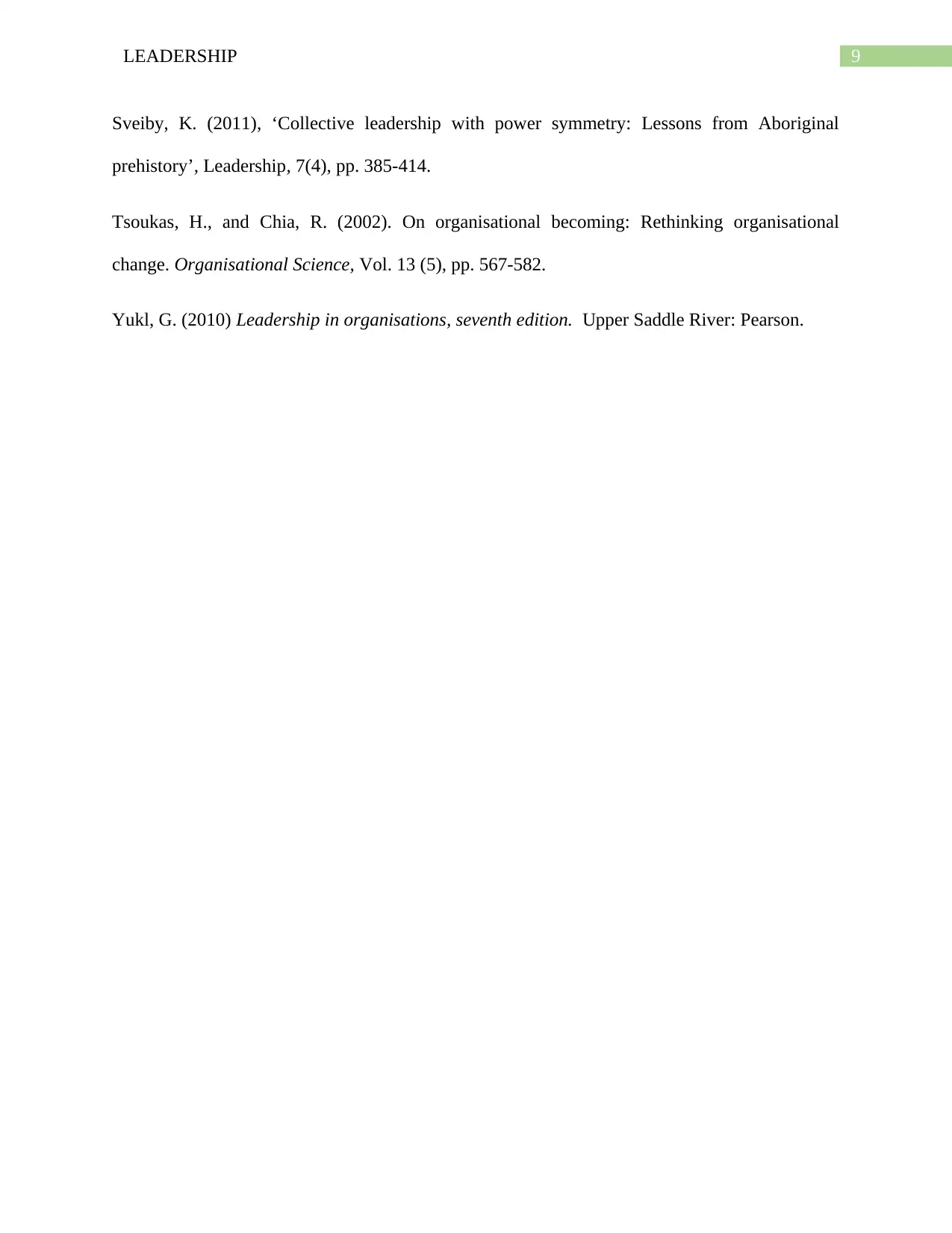
9LEADERSHIP
Sveiby, K. (2011), ‘Collective leadership with power symmetry: Lessons from Aboriginal
prehistory’, Leadership, 7(4), pp. 385-414.
Tsoukas, H., and Chia, R. (2002). On organisational becoming: Rethinking organisational
change. Organisational Science, Vol. 13 (5), pp. 567-582.
Yukl, G. (2010) Leadership in organisations, seventh edition. Upper Saddle River: Pearson.
Sveiby, K. (2011), ‘Collective leadership with power symmetry: Lessons from Aboriginal
prehistory’, Leadership, 7(4), pp. 385-414.
Tsoukas, H., and Chia, R. (2002). On organisational becoming: Rethinking organisational
change. Organisational Science, Vol. 13 (5), pp. 567-582.
Yukl, G. (2010) Leadership in organisations, seventh edition. Upper Saddle River: Pearson.
1 out of 10
Related Documents
Your All-in-One AI-Powered Toolkit for Academic Success.
+13062052269
info@desklib.com
Available 24*7 on WhatsApp / Email
![[object Object]](/_next/static/media/star-bottom.7253800d.svg)
Unlock your academic potential
Copyright © 2020–2026 A2Z Services. All Rights Reserved. Developed and managed by ZUCOL.




